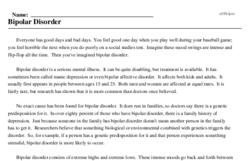Bipolar Disorder
Everyone has good days and bad days. You feel good one day when you play well during your baseball game; you feel horrible the next when you do poorly on a social studies test. Imagine these mood swings are intense and flip-flop all the time. Then you've imagined bipolar disorder.
Bipolar disorder is a serious mental illness. It can be quite disabling, but treatment is available. It has sometimes been called manic depression or even bipolar affective disorder. It affects both kids and adults. It usually first appears in people between ages 15 and 25. Both men and women are affected at equal rates. It is fairly rare, but research has shown that it is more common than doctors once believed.
No exact cause has been found for bipolar disorder. It does run in families, so doctors say there is a genetic predisposition for it. In over eighty percent of those who have bipolar disorder, there is a family history of depression. Just because someone in the family has bipolar disorder doesn't mean another person in the family has to get it. Researchers believe that something biological or environmental combined with genetics triggers the disorder. So, for example, if a person has a genetic predisposition for it and that person experiences something stressful, bipolar disorder is more likely to occur.




